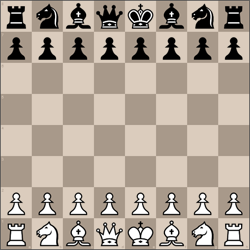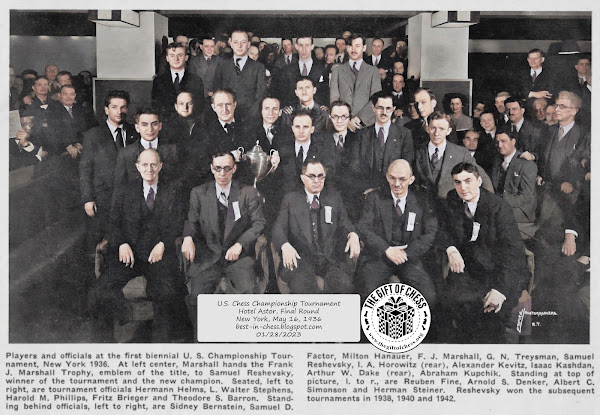Back to Home Index
July 07 1941
The Atlanta Constitution, Atlanta, Georgia, Monday, July 07, 1941
Youth Baffles Experts, Wins Title at Chess
Defeats 8-Times Champion in 'Sensational' Game.
By CHARLES GILMORE.
Playing in his first important I match, a 21-year-old deaf youth from Esmont, Va., won the Southern Open chess tournament here yesterday after he had defeated an eight-time champion in a game that experts described as “sensational.”
His victory was planned during the first few moves of the crucial game when he suddenly astounded veterans by sacrificing a pawn with apparently no reason. The move, an utterly new tactic in chess, paved the way to success.
He is L. R. Chauvenet, and he entered the tournament as an underdog. But during the strenuous play he lost only one game, that to J. R. Jackson, an accountant of 660 Virginia avenue, who was Georgia's only representative in the championship division of chess. This game was lost after he had clinched the championship.
Battle of Wits.
To win the match Chauvenet beat Nestor Hernandez, of Tampa, Fla. Neither man had lost a game when they met, and their battle of wits attracted the attention of experts from all parts of the nation who attended the event.
After the preliminary moves of the deciding game, the match went into a Sicilian defense, which means, roughly, that both players agreed to fight it out to the end and eliminate the possibility of a draw or stalemate. Experts called it a “dangerous, cut-throat” defense, at which Hernandez was a master.
Indeed, when after a few moves Chauvenet “threw” away a pawn, it appeared to observers that Hernandez had again won a victim. But the master only fell into a well-laid trap, and when he captured the sacrificed piece, he gave Chauvenet the initiative that developed into an irresistible attack.
Many Atlantans competed in the tournament, held at the Biltmore hotel. Contestants played each other at long tables, marked with the familiar checkered boards.
Atlantan Wins.
One Atlantan, J. E. Woody, of 483 Wabash avenue, won the class A division title. He was the only player to go through the tourney without the loss of a single game. He was not competing in the championship division, however.
Woody was drawn twice, once by Peter G. Cranford, of 156 Waverly way, and once by D. B. Bryan, of Durham, N. C. Cranford and Alfred Barnard, of 790 Ponce de Leon place, along with J. M. Palmer, of Norfolk, Va., were tied three ways for fourth place. Joseph Taylor, of Chattanooga, Tenn., was second in the class A group and Bryan was third.
The championship play, however, drew most of the attention and it built up naturally to the climax between the youth who lost his hearing at the age of 9, when stricken by infantile paralysis, and the master of Tampa, Florida.
So complicated was the game, and so subtle was Chauvenet's master pawn move and his crashing check which forced Hernandez to resign at the end, that it is now being annotated by the winner so that chess fans can actually determine what happened.
Pawn Sacrifice.
The pawn sacrifice occurred near the outset of the game. In the customary “Forsyth Notation,” the board was set up at the time as follows, with Black played by Hernandez and White by Chauvenet:
FEN 4rnkq/1p3p1p/p4P2/4p1P1/1P1pQ3/2rB2R1/2P4P/R6K b - - 1 32
From this arrangement, with Hernandez moving, his bishop captured a knight at queen's bishop's 3. Chauvenet, with a pawn, captured the attacking bishop. Then it was that Hernandez took the fatal pawn with his pawn at king's 5.
The move gave the young Virginian the initiative, and later the game.
The check was arrived at with a board as follows:
FEN 4r1kq/1Q3p2/p4PR1/4p3/1P1p1n2/2rB4/2P4P/R6K b - - 0 35
White to move:
1. Q-K4 N-N3
2. QxNP N-B5
3. P-N6 RPxP
4. RxPch! Resigns.
|
1. Qe4 Ng6
2. Qxb7 Nf4
3. g6 hxg6
4. Rxg6+ Resigns.
|
At this stage, if Hernandez had captured the checking bishop with a rook, Chauvenet would have moved his rook to his knight's spot and checked again. The only answer would be the motion of the king to rook's 2, which Chauvenet could counter by capturing the rook with his queen and checking again, setting up two lines.
With Hernandez placing second in the championship division, third place went to A. T. Henderson, of Lynchburg, Va., W. W. Gibbs, or Staunton, Va., and W. N. Woodbury of Birmingham, tied for fourth place.
In the Class B division, J. T. Stallings, of Winston-Salem, N. C., defeated Francis F. Shurling, of 1230 Piedmont avenue, in the playoff.
In a business meeting, W. N. Woodbury was elected president of the Southern Chess Association; J. E. Woody was named vice president, and W. W. Gibbs was chosen secretary and treasurer.
A Georgia state champion will be selected on Labor Day in a tournament sponsored by the Atlanta Chess League, which is one of the largest in the south with its 75 members.
July 08 1941
The Atlanta Journal, Atlanta, Georgia, Tuesday, July 08, 1941
Virginian, 21, Cops Southern Chess Crown
L. R. Chauvenet, brilliant 21 year-old chess expert from Esmont, Va., became Southern champion Sunday by winning a crucial game from N. Hernandez of Tampa, Fla., and drawing the final game with ex-champion W. N. Woodbury, of Birmingham, Ala. Chauvenet lost only one game, and that to J. R. Jackson, of Atlanta, Georgia's lone representative in the championship division.
Chauvenet has been playing since he was 9 years of age, and was good enough to be the first freshman to play a Harvard chess team. Due to an attack of spinal meningitis, he is deaf but not seemingly handicapped. The Southern championship is his first major victory. Hernandez placed second. A. T. Henderson of Lynchburg, Va took third. W. N. Woodbury, of Birmingham, and W. W. Gibbs, of Lynchburg, tied for fourth.
J. E. Woody, of Atlanta, won handily in the Class A section with no losses in seven games against D. B. Bryan, of Durham, N. C., and Peter G. Cranford, of Atlanta. By virtue of his victory, Mr. Woody automatically qualifies for the championship flight next year. Joseph Taylor, Chattanooga, took second place. D. B. Bryan was third. Alfred Barnard and Peter G. Cranford, both of Atlanta, were in a three-way tie for fourth place, with J. M. Palmer, Norfolk, Va.
J. T. Stallings, Winston-Salem, N. C., expert, defeated Francis F. Shurling, well-known Atlanta political figure, for the Class B title in a play-off. Stallings lost one game to Elijah Brown, Atlanta attorney. Mrs. J. R. Harrison, Macon, placed fourth.
In the business session which preceded the awarding of prizes, W. N. Woodbury was elected president of the Southern Chess Association. J. E. Woody, Class A titleholder, was elected vice president, and W. W. Gibbs secretary-treasurer.

October 01, 1941
Evening star, Washington, District of Columbia, Wednesday, October 01, 1941
Southern Chess Championship, 1941.
Louis Russell Chauvenet (white) vs. Nestor Hernandez (black)
Sicilian Defense: Richter-Rauzer Variation

Descriptive
1. P-K4 P-QB4
2. N-KB3 N-QB3
3. P-Q4 PxP
4. NxP N-B3
5. N-QB3 P-Q3
6. QB-N5 Q-R4
7. BxN NPxB
8. B-N5 B-Q2
9. N-N3 Q-Q
10. O-O B-N2
11. K-R P-QR3
12. B-K2 P-B4
13. P-B4 B-K3
14. P-KN4 BxQN
15. PxB BxN
16. RPxB PxKP
17. Q-Q5 Q-Q2
18. P-QN4 R-QB
19. QR-Q Q-K3
20. Q-KR5 Q-N3
21. Q-R4 Q-N2
22. Q-R3 N-Q
23. R-Q4 N-K3
24. P-N5 O-O
25. RxKP RxP
26. B-Q3 P-Q4
27. R-K3 P-Q5
28. R-N3 R-K
29. P-B5 N-B
30. P-B6 Q-R
31. Q-R4 P-K4
32. Q-K4 N-N3
33. QxNP N-B5
34. P-N6 RPxP
35. RxPch! 1-0
|
Algebraic
1. e4 c5
2. Nf3 Nc6
3. d4 cxd4
4. Nxd4 Nf6
5. Nc3 d6
6. Bg5 Qa5
7. Bxf6 gxf6
8. Bb5 Bd7
9. Nb3 Qd8
10. 0-0 Bg7
11. Kh1 a6
12. Be2 f5
13. f4 Be6
14. g4 Bxc3
15. bxc3 Bxb3
16. axb3 fxe4
17. Qd5 Qd7
18. b4 Rc8
19. Rfd1 Qe6
20. Qh5 Qg6
21. Qh4 Qg7
22. Qh3 Nd8
23. Rd4 Ne6
24. g5 0-0
25. Rxe4 Rxc3
26. Bd3 d5
27. Re3 d4
28. Rg3 Re8
29. f5 Nf8
30. f6 Qh8
31. Qh4 e5
32. Qe4 Ng6
33. Qxb7 Nf4
34. g6 hxg6
35. Rxg6+! 1-0 |
If 35. … NxR; 36. BxN R-KB; 37. BxPch! and wins.
This was the crucial game of the 1941 Southern Chess Association championship tournament at Atlanta. Russell Chauvenet of Esmont, Va., gained the title by outplaying A. T. Henderson and Nestor Hernandez, sometime titleholder.





























































